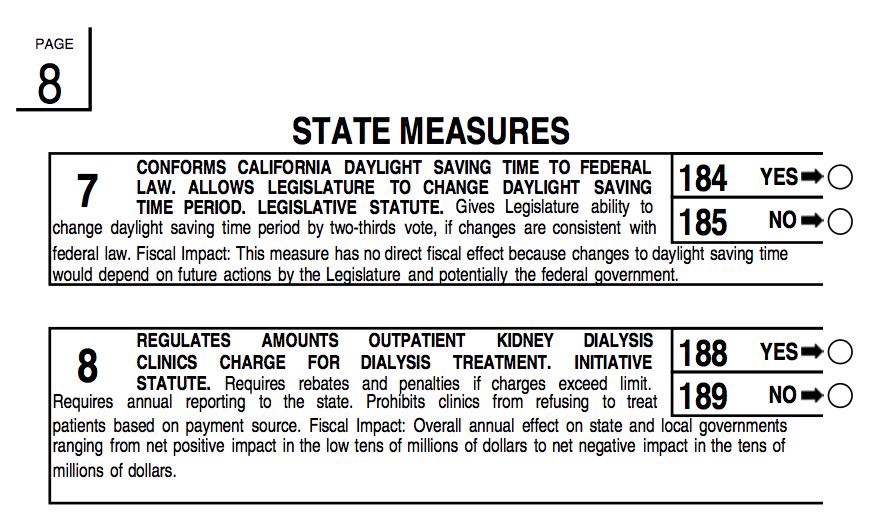
In November, voters in California passed Proposition 7. What you might not know is that the text on the ballot and the voter guide almost avoided mentioning permanent DST. Here?s the voter guide: ?Establishes the time zone designated by federal law as ?Pacific standard time? as the standard time within California.? It?s only later in the description, the sponsor notes that the Legislature might vote for permanent DST.
This confusing language created two groups: those listening to the press interviews with Rep. Kansen Chu knew that the goal was for permanent DST (it was extremely clear in the news), but everyone else had to figure it out.
Given this confusing ballot, it?s remarkable that legislators speak as if this vote represents a clear mandate for permanent DST. Perhaps for voters who heard press coverage of Prop 7, this could be true, but I?ve talked to so many who didn?t know this, or even were confused about the ?back/forward? question, and thought they?d be able to sleep more in the wintertime. For the record, we think it should be clear that nobody has asked the question about which schedule voters prefer.
In Germany, voters were asked to make a choice, with language written using words that I?m told translate to ?permanent summer? and ?permanent winter?. With language written like this, it should be clear that voters are not equipped to choose Standard Time. Who would vote for a German winter all year long?
As with many things, the role of government is to balance the needs of many parties, and here it can only be said that the early birds are being well represented by this rather opinionated language. And also, because younger people don?t turn out to vote, their ?night owl? votes have not been counted. Let?s find the middle.
Legislators must balance needs of early birds and night owls
Even if permanent ?daylight time? were the more popular vote (and it is favored by a lot of people), we think the public health evidence shows that higher obesity rates, higher cancer rates, higher accident rates, and more depression should sway the debate in the direction we have outlined here, to permanent standard time.
We do not think that government should find the best solution only for the early birds (even if they are the citizens who turn out to vote), and instead, they should find the best balance of timing for everyone. Epidemiological evidence from several different sources says that our schedules are already causing our sleep to be restricted, and it?s harming our health. Making us all wake up early in the winter will do more harm.
Setting our clocks to Standard Time, so that noon is when the sun is directly overhead, is the sensible and better choice.
If you are in California and would like to voice your preference to your representative, you can find the right person to speak with at findyourrep.
In Florida, you can use this link to find your representative.
Selected References
- Gu, F., Xu, S., Devesa, S. S., Zhang, F., Klerman, E. B., Graubard, B. I., & Caporaso, N. E. (2017). Longitude position in a time zone and cancer risk in the United States. Cancer Epidemiology and Prevention Biomarkers, 26(8), 1306?1311. http://cebp.aacrjournals.org/content/cebp/early/2017/04/27/1055-9965.EPI-16-1029.full.pdf
- Strogatz, S. H., Kronauer, R. E., & Czeisler, C. A. (1987). Circadian pacemaker interferes with sleep onset at specific times each day: role in insomnia. American Journal of Physiology-Regulatory, Integrative and Comparative Physiology, 253(1), R172-R178. http://www.math.wsu.edu/math/faculty/schumaker/Math415/Strogatzetal87.pdf
- Spiegel, K., Leproult, R., & Van Cauter, E. (1999). Impact of sleep debt on metabolic and endocrine function. The lancet, 354(9188), 1435?1439. https://www.semanticscholar.org/paper/Impact-of-sleep-debt-on-metabolic-and-endocrine-Spiegel-Leproult/9a134f5c0af43a38e27c1cfa61c6c8abab4a6d22
- Wittmann, M., Dinich, J., Merrow, M., & Roenneberg, T. (2006). Social jetlag: misalignment of biological and social time. Chronobiology international, 23(1?2), 497?509. http://citeseerx.ist.psu.edu/viewdoc/download?doi=10.1.1.1011.9782&rep=rep1&type=pdf
- Kantermann, T., Juda, M., Merrow, M., & Roenneberg, T. (2007). The human circadian clock?s seasonal adjustment is disrupted by daylight saving time. Current Biology, 17(22), 1996?2000. https://www.sciencedirect.com/science/article/pii/S0960982207020866
- Roenneberg, T., Allebrandt, K. V., Merrow, M., & Vetter, C. (2012). Social jetlag and obesity. Current Biology, 22(10), 939?943. https://www.sciencedirect.com/science/article/pii/S0960982212003259
- Lane, J. M., Chang, A. M., Bjonnes, A. C., Aeschbach, D., Anderson, C., Cade, B. E., ? & Gottlieb, D. J. (2016). Impact of common diabetes risk variant in MTNR1B on sleep, circadian, and melatonin physiology. Diabetes, 65(6), 1741?1751. http://diabetes.diabetesjournals.org/content/diabetes/65/6/1741.full.pdf
- Milewski, M. D., Skaggs, D. L., Bishop, G. A., Pace, J. L., Ibrahim, D. A., Wren, T. A., & Barzdukas, A. (2014). Chronic lack of sleep is associated with increased sports injuries in adolescent athletes. Journal of Pediatric Orthopaedics, 34(2), 129?133. https://www.ncbi.nlm.nih.gov/pubmed/25028798
- Ripley, NYTimes archives, 1974. Senate Votes Return to Standard Time For Four Months and Sends Bill to Ford. https://www.nytimes.com/1974/10/01/archives/senate-votes-return-to-standard-time-for-four-months-and-sends-bill.html